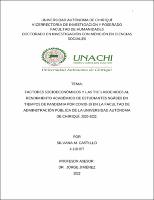Mostrar el registro sencillo del ítem
Factores socioeconómicos y las Tic´s asociados al rendimiento académico de estudiantes Ngâbes
| dc.contributor.advisor | Jiménez, Jorge | |
| dc.contributor.author | Castillo, Silvana M. | |
| dc.date.accessioned | 2023-07-13T16:11:28Z | |
| dc.date.available | 2023-07-13T16:11:28Z | |
| dc.date.issued | 2022 | |
| dc.identifier.uri | http://jadimike.unachi.ac.pa/handle/123456789/791 | |
| dc.description.abstract | La presente investigación parte del supuesto de que los factores socioeconómicos y TIC’s están asociados al rendimiento académico de los estudiantes originarios ngäbe y plantea el objetivo general de evaluar los factores socioeconómicos y las TIC asociados al rendimiento académico del estudiante ngäbe en tiempos de pandemia por COVID-19 de la Facultad de Administración Pública en la Universidad Autónoma de Chiriquí, 2020-2022. Se utilizó la metodología mixta, con un alcance descriptivo y correlacional para la parte cuantitativa y diseño fenomenológico para la cualitativa. Se manejó la muestra caso tipo, constituida por el censo poblacional que asiste a las diversas carreras que oferta la Facultad de Administración Pública, por lo que no se utilizó muestreo. La información se recopiló a través de la encuesta y entrevista semiestructurada y se analizaron con el programa estadístico SPSS y Atlas Ti. El estudio correlacional rechazó la hipótesis de investigación de que tanto los factores socioeconómicos y el acceso de las no tenían una relación significativa con el rendimiento académico, las consideraciones expresadas por los estudiantes en la parte cualitativa del estudio, sugieren que de alguna manera estas variables limitan, aunque, no son significativamente relevantes con respecto a su rendimiento; de todas maneras considerar la problemática que expresaron debe conllevar esfuerzos de la universidad para mejorar los rendimientos académicos de los estudiantes Ngäbes, sobre todo, de los que residen en las áreas rurales o comarcales. | es_ES |
| dc.description.abstract | This research is based on the assumption that socioeconomic factors and ICTs are associated with the academic performance of native students and raises the general objective of evaluating socioeconomic factors and ICTs associated with the academic performance of the Ngäbe student in times of pandemic by COVID-19 of the Faculty of Public Administration at the Autonomous University of Chiriquí, 2020-2022. The mixed methodology was used, with a descriptive and correlational scope for the quantitative part and phenomenological design for the qualitative. The sample case type was handled, constituted by the population census that attends the various careers offered by the Faculty of Public Administration, so sampling was not used. The information was collected through the semi-structured survey and interview and analyzed with the SPSS and Atlas Ti statistical program. While it is true that the correlational study rejects the research hypothesis that both socioeconomic factors and access to them did not have a significant relationship with academic performance, the considerations expressed by students in the qualitative part of the study suggest that in some way these variables limit although they are not significantly relevant with respect to their performance; in any case consider the problem that They said it should involve efforts by the university to improve the academic performance of Ngäbes students, especially those residing in rural or county areas. | en_Us |
| dc.description.abstract | FACTORES SOCIOECONÓMICOS | |
| dc.description.abstract | TIC¨S | |
| dc.description.abstract | RENDIMIENTO ACADÉMICO | |
| dc.description.abstract | ESTUDIANTE NGÄBE | |
| dc.description.abstract | PANDEMIA COVID-19 | |
| dc.language.iso | es | es_ES |
| dc.publisher | Universidad Autónoma de Chiriquí | es_ES |
| dc.subject | ADMINISTRACIÓN PÚBLICA | es_ES |
| dc.subject | TECNOLOGÍAS - ENSEÑANZA | es_ES |
| dc.subject | RENDIMIENTO ACADÉMICO - POBLACIÓN INDÍGENA | es_ES |
| dc.subject | ECONOMÍA- -- TECNOLOGÍA DE LA ENSEÑANZA | es_ES |
| dc.subject | TESIS -DOCTORADO EN INVESTIGACIÓN | es_ES |
| dc.title | Factores socioeconómicos y las Tic´s asociados al rendimiento académico de estudiantes Ngâbes | es_ES |
| dc.type | Thesis | es_ES |

